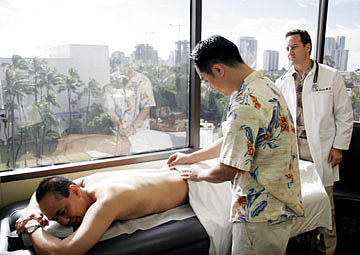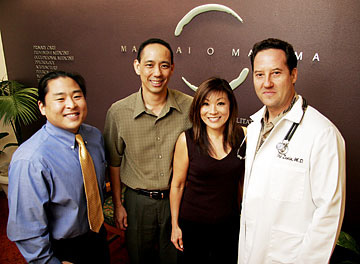HEALTH

CRAIG T. KOJIMA / CKOJIMA@STARBULLETIN.COM
Michael Koyama heard horror stories about back surgery and he didn't want to go through it. Instead, he went to Manakai O Malama Integrative Healthcare Group and Rehabilitation Center, headed by Dr. Ira Zunin, right. Takeshi Otsuka treats Koyama, above, with accupuncture as part of a multidisciplined therapy.
|
|
One good turn ...
A Honolulu clinic that offers different forms of health care sets up a fund to help needy patients
MICHAEL KOYAMA is not back to golfing yet, but occasionally plays tennis -- something he "couldn't even have thought of a year ago."
He was in severe back pain with a herniated disc last April when a friend referred him to Manakai O Malama Integrative Healthcare Group and Rehabilitation Center.
Want to help?
People may call, write or visit the center to donate to the Malama Fund or apply for assistance.
For more information, call Dr. Ira Zunin at 535-5555.
|
He and his wife, Patti, both Realtors working as a team for Prudential Locations, were so happy with his treatment, they donated $10,000 to the Malama Fund at the center to help uninsured and underinsured patients obtain care.
Koyama said he had been to a couple of doctors who told him he needed surgery, "and I heard quite a few horror stories about back surgery. I really didn't want to go through it."
So he went to see Dr. Ira Zunin, founder and president of Manakai O Malama, "and went through his integrated services, including physical and massage therapy and acupuncture."
Koyama said he had "fairly rapid recovery. ... I am still not able to golf, but I was on my back for a few days (before treatment) and couldn't do anything. It was a very scary feeling."
Zunin, former executive director of the nonprofit Hawaii State Consortium for Integrative Health Care, founded Manakai O Malama in June 2002. The clinic is on the sixth floor of the Honolulu Club building, 932 Ward Ave.
"We've seen probably 80,000 patient visits since we opened, so we've been very busy," Zunin said, explaining he is trying "to bring together the best of modern medicine and traditional healing arts."
The center offers traditional Chinese medicine, acupuncture, therapeutic massage and naturopathy, as well as conventional medical services including primary care, preventive health care and screening, occupational medicine, physical therapy and psychological counseling.
WESTERN doctors and traditional practitioners coordinate treatment "to give patients the best possible care," Zunin said, adding that this "is allowing us to solve big problems."
He said things like pain management, weight loss and stress "are difficult to manage by one doctor in one isolated office. A lot of these things require a coordinated team."
Koyama said he had several months of intensive treatment by three practitioners for massage therapy, physical therapy and acupuncture. He saw each one about twice a week, he said.
"It made a big difference in my life, that's for sure," Koyama said. "That's one big reason why we decided to contribute to the fund. My wife saw the pain I was in. It was an eye-opening experience."
Patti Koyama, who made Zunin her primary care physician, said she had hoped for a long time to find a doctor who incorporated conventional medicine with alternative therapies.
She said his approach to health care was "very refreshing and very exciting. ... I thought it was going to be a really good fit. It allows you to have a choice in your own care, and also you don't have to take a pharmaceutical drug necessarily."
She saw how acupuncture helped relieve her husband's pain and, after some initial reluctance, she also had acupuncture several times, she said. She had been feeling "unusually tired" and had the treatment after an assessment with traditional Chinese medicine, she said.

CRAIG T. KOJIMA / CKOJIMA@STARBULLETIN.COM
Sean G. Tadaki, left, and Michael and Patti Koyama have donated money to the Malama Fund.
|
|
KOYAMA SAID Zunin explained that he was establishing a Malama Fund with donations because he had many patients who could not afford the services or even co-payments if they did have some kind of medical insurance.
"We were very, very positive not only about his ability, but his heart," Koyama said. "He has a lot of compassion for people who need health services but really can't afford it."
He said Zunin had been providing health care in some cases with no reimbursements but would have to stop that at some point.
Koyama said he had to pay for most of his treatments out of pocket because his Hawaii Medical Service Association plan only covers physical therapy.
"I bought these (treatment) packages, but I was thinking, 'Wow, if you can't afford it, how do you do it?'" Koyama said. "They just go without.
"I've never experienced pain like that before. I don't know how people can function if they don't get rid of pain."
Zunin said his goal is to raise $120,000 this year for the Malama Fund so $10,000 is available each month to provide care for people who do not have any insurance or enough insurance.
He said the fund offers an opportunity to support Hawaiian healers, who traditionally do not charge but can be reimbursed for their services through the donations.
"Our lead grants so far are from patients that have been very grateful for their care and wanted to extend resources to the underserved to have better access to this type of care," Zunin said.
He said he has received word that a Dutch patient who travels here will donate $25,000 to the fund if it can be matched in the United States.
SEAN TADAKI, a partner at Colliers Monroe Friedlander Inc., also is giving the clinic an undisclosed sum for the fund in appreciation for treatments of his grandmother a year ago, Zunin said.
She had been inactive but, after several months of integrated care, began walking independently and eating well, he said. She recently celebrated her 92nd birthday.
"We're looking for donations and letting people know they have access to care and the benefit of integrative health care," Zunin said. "We are very serious about health disparities in this state and access to all. This is our way of making a small contribution to a big problem."
Koyama said the starting grant from him and his wife "helped quite a few people. That made us feel good about it as well. It is our way to give back to the community. The community has been very good to us."
Zunin said an objective third party will review applications for help from the fund.
"We're trying to identify priority patients," he said. "We want somebody looking at human factors involved."

